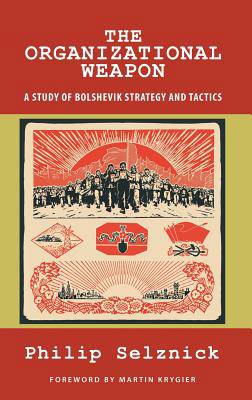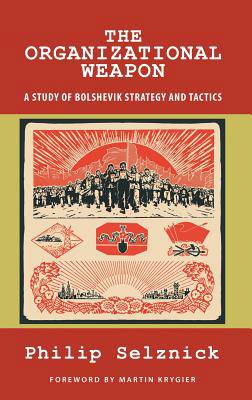
- Retrait gratuit dans votre magasin Club
- 7.000.000 titres dans notre catalogue
- Payer en toute sécurité
- Toujours un magasin près de chez vous
- Retrait gratuit dans votre magasin Club
- 7.000.0000 titres dans notre catalogue
- Payer en toute sécurité
- Toujours un magasin près de chez vous
The Organizational Weapon
A Study of Bolshevik Strategy and Tactics
Philip Selznick
Livre relié | Anglais
47,45 €
+ 94 points
Format
Description
THE ORGANIZATIONAL WEAPON is a classic study of the methods, propaganda, and institutions which create infiltration and eventually cooptation of organizations from within. The 2014 edition features a modern presentation and an extensive, substantive new introduction by Selznick's premier biographer, Martin Krygier. [NOTE: Although this description may appear under used copies of older, superseded editions, in fact the new Foreword and modern formatting is only available in editions specifically listed by Quid Pro Books.] - The study applies its theory to communist techniques, but its analysis and insights have, over the years, become extremely useful in identifying and combating such methods in jihadist cells, terrorist organizations, and political groups of many varieties, not only from the Left. Its utility is demonstrated in how it has influenced and been cited by current writers on how extremist and politically astute groups recruit and infiltrate more benign organizations to make them tools of further expansion in power and action. The book is also considered excellent social science and history, analyzing an important period in time when trade organizations, community groups, and the like became affected by Soviet encroachment and Marxist influence. Its insights, from one of the most esteemed and creative social scientists, have stood the test of time. - The new edition from Quid Pro Books features a detailed and insightful new Foreword by Martin Krygier, a senior professor of law and social theory at the law school of the University of New South Wales, and adjunct professor at Australian National University. Krygier is the author of PHILIP SELZNICK: IDEALS IN THE WORLD (Stanford, 2012). - Krygier explains several "compelling" contemporary reasons to consider this work: "the world-historical significance of the movement the book analyzes; the particular combination of political understanding and engagement with theoretical sophistication which Selznick brought to his subject; the distinctive focus and character of the analysis; and its continuing significance, in relation both to enduring social problems and to the oeuvre of a distinguished and distinctive thinker. On each of these levels, this book is exemplary." Moreover, "communists are not the only people with an interest in converting adherents into 'deployable agents.' Modern terrorist organizations, radically different in their goals, have a similar organizational need and ambition. ... Students of other organizations that seek to convert adherents into 'deployable agents' might well find suggestive contemporary parallels," Krygier notes. In sum, this book is "far more than an ephemeral political intervention and at the same time more engaged and engaging than is common in academic work. This is one more reason among several to commend this work to a new generation of readers." - Part of the 'Classics of the Social Sciences' Series from Quid Pro Books, this is an authorized and unabridged republication of the original work. Pagination of the prior editions is embedded into the text, to promote continuity in citation, referencing, and classroom assignment -- as well as consistency with new ebook editions from Quid Pro.
Spécifications
Parties prenantes
- Auteur(s) :
- Editeur:
Contenu
- Nombre de pages :
- 306
- Langue:
- Anglais
Caractéristiques
- EAN:
- 9781610278300
- Date de parution :
- 31-12-14
- Format:
- Livre relié
- Format numérique:
- Genaaid
- Dimensions :
- 156 mm x 234 mm
- Poids :
- 648 g

Les avis
Nous publions uniquement les avis qui respectent les conditions requises. Consultez nos conditions pour les avis.






